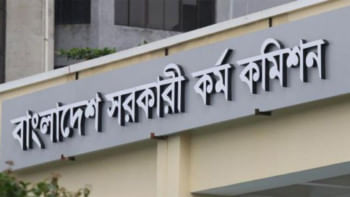Can we trust PSC with the recruitment of best young minds?

The Bangladesh Public Service Commission (BPSC) has long been regarded as the gold standard for recruitment in government jobs. Revered for its transparency and fairness, the BPSC has been a beacon of hope for countless students, teachers, and guardians. The institution has always been regarded as a merit-based body, ensuring that government positions are filled by the most qualified candidates. The recruitment exams are highly competitive and require rigorous preparation. Every year, hundreds of thousands of aspirants compete for a coveted spot in government service, especially through the prestigious Bangladesh Civil Service (BCS) exam.
However, recent revelations of corruption within the BPSC threaten to destroy the trust that generations have placed in this institution. A recent investigative report by Channel24 uncovered shocking evidence of question paper leaks in various Public Service Commission examinations, including the ones for cadre and non-cadre posts.
According to the report, questions for the test to recruit people for 516 posts in Bangladesh Railway held this year in July were leaked, as well as question papers for 30 other cadre and non-cadre examinations, including BCS exams. Several PSC officials were involved in the racket and they have amassed a huge amount of money by selling questions. Some PSC officials even admitted to leaking exam papers and selling them to eager aspirants.
This scandal is a severe blow to the thousands of honest, hardworking candidates who dedicate years to prepare for these exams. It is also disheartening for many who are still protesting and demanding a reduction in the quota system for government jobs. Their demonstrations, taking place across the country, indicate Bangladeshi youth's desire for fair and merit-based recruitment. However, the corruption within the BPSC shows that dishonest individuals enjoyed an advantage over meritorious students in several government recruitments tests and perhaps secured a much-coveted government job using dishonest means.
The intense pressure candidates face to pursue a career in government jobs and the high stakes involved in taking BCS exams are evident not only in the ongoing quota reform movement but also the demand students made a few months ago for an increase in the age limit from 30 to 35 for entry-level government jobs. Many view the chance to sit for a BPSC exam as a lifeline to a stable and prestigious career. The age limit debate and the anti-quota protests clearly show the immense importance placed on government jobs and the extent to which students are willing to go to secure them. The emotional and psychological impact on students upon learning about the corruption in the BPSC cannot be overstated. For those who have invested countless hours in exam preparation, the knowledge that their efforts may have been in vain, is devastating. The scandal will destroy trust in the BPSC and cast a shadow over the entire recruitment process. It's an open secret now that merit could be compromised by corruption even in BPSC exams.
However, the blame does not lie solely with the BPSC. The report alleged that the racket within the BPSC has been leaking questions for almost a decade. This leads to the question: where was the institutional check and balance that could have prevented such fraud? The government's negligence in overseeing and ensuring the integrity of the recruiting body is glaring and it has undermined the dreams and efforts of thousands of students. This has tarnished the reputation of not just the BPSC, but the entire civil service recruitment process.
The broader implications of this scandal are deeply troubling. When corruption within a respected body like the BPSC is exposed, it sends shockwaves through society, breeding widespread disappointment and despair. This scandal raises serious questions about the integrity of other public institutions too. It also reveals the extent to which corruption has taken root in our system. For job aspirants, it is a heart-wrenching situation which implies that our country may favour dishonest and the well-connected individuals over diligent, meritorious students who dream of serving their nation with integrity. This betrayal strikes at the very core of our values, leaving our youth feeling hopeless and demoralised, questioning whether their hard work and dedication will ever truly be rewarded.
Arafat Rahaman is a reporter at The Daily Star. He can be reached at [email protected].
Views expressed in this article are the author's own.
Follow The Daily Star Opinion on Facebook for the latest opinions, commentaries and analyses by experts and professionals. To contribute your article or letter to The Daily Star Opinion, see our guidelines for submission.

 For all latest news, follow The Daily Star's Google News channel.
For all latest news, follow The Daily Star's Google News channel. 










Comments